当代研究生英语原文及翻译(下册)
- 格式:doc
- 大小:422.50 KB
- 文档页数:38
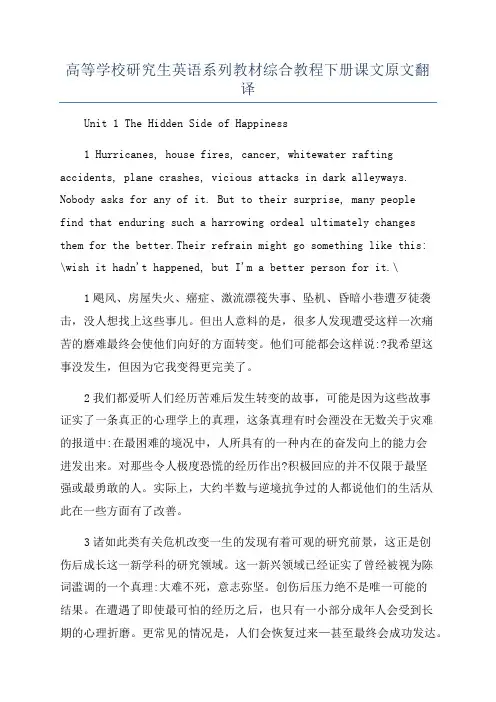
高等学校研究生英语系列教材综合教程下册课文原文翻译Unit 1 The Hidden Side of Happiness1 Hurricanes, house fires, cancer, whitewater rafting accidents, plane crashes, vicious attacks in dark alleyways. Nobody asks for any of it. But to their surprise, many peoplefind that enduring such a harrowing ordeal ultimately changes them for the better.Their refrain might go something like this:\wish it hadn't happened, but I'm a better person for it.\ 1飓风、房屋失火、癌症、激流漂筏失事、坠机、昏暗小巷遭歹徒袭击,没人想找上这些事儿。
但出人意料的是,很多人发现遭受这样一次痛苦的磨难最终会使他们向好的方面转变。
他们可能都会这样说:?我希望这事没发生,但因为它我变得更完美了。
2我们都爱听人们经历苦难后发生转变的故事,可能是因为这些故事证实了一条真正的心理学上的真理,这条真理有时会湮没在无数关于灾难的报道中:在最困难的境况中,人所具有的一种内在的奋发向上的能力会进发出来。
对那些令人极度恐慌的经历作出?积极回应的并不仅限于最坚强或最勇敢的人。
实际上,大约半数与逆境抗争过的人都说他们的生活从此在一些方面有了改善。
3诸如此类有关危机改变一生的发现有着可观的研究前景,这正是创伤后成长这一新学科的研究领域。
这一新兴领域已经证实了曾经被视为陈词滥调的一个真理:大难不死,意志弥坚。
创伤后压力绝不是唯一可能的结果。
在遭遇了即使最可怕的经历之后,也只有一小部分成年人会受到长期的心理折磨。
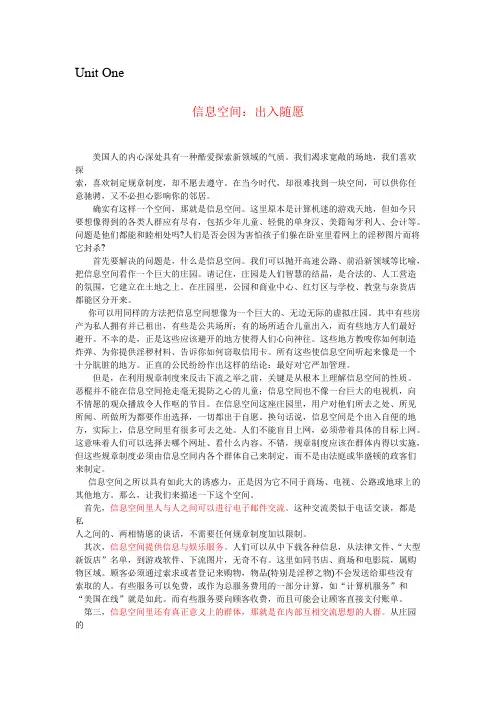
Unit One信息空间:出入随愿美国人的内心深处具有一种酷爱探索新领域的气质。
我们渴求宽敞的场地,我们喜欢探索,喜欢制定规章制度,却不愿去遵守。
在当今时代,却很难找到一块空间,可以供你任意驰骋,又不必担心影响你的邻居。
确实有这样一个空间,那就是信息空间。
这里原本是计算机迷的游戏天地,但如今只要想像得到的各类人群应有尽有,包括少年儿童、轻佻的单身汉、美籍匈牙利人、会计等。
问题是他们都能和睦相处吗?人们是否会因为害怕孩子们躲在卧室里看网上的淫秽图片而将它封杀?首先要解决的问题是,什么是信息空间。
我们可以抛开高速公路、前沿新领域等比喻,把信息空间看作一个巨大的庄园。
请记住,庄园是人们智慧的结晶,是合法的、人工营造的氛围,它建立在土地之上。
在庄园里,公园和商业中心、红灯区与学校、教堂与杂货店都能区分开来。
你可以用同样的方法把信息空间想像为一个巨大的、无边无际的虚拟庄园。
其中有些房产为私人拥有并已租出,有些是公共场所;有的场所适合儿童出入,而有些地方人们最好避开。
不幸的是,正是这些应该避开的地方使得人们心向神往。
这些地方教唆你如何制造炸弹、为你提供淫秽材料、告诉你如何窃取信用卡。
所有这些使信息空间听起来像是一个十分肮脏的地方。
正直的公民纷纷作出这样的结论:最好对它严加管理。
但是,在利用规章制度来反击下流之举之前,关键是从根本上理解信息空间的性质。
恶棍并不能在信息空间抢走毫无提防之心的儿童;信息空间也不像一台巨大的电视机,向不情愿的观众播放令人作呕的节目。
在信息空间这座庄园里,用户对他们所去之处、所见所闻、所做所为都要作出选择,一切都出于自愿。
换句话说,信息空间是个出入自便的地方,实际上,信息空间里有很多可去之处。
人们不能盲目上网,必须带着具体的目标上网。
这意味着人们可以选择去哪个网址、看什么内容。
不错,规章制度应该在群体内得以实施,但这些规章制度必须由信息空间内各个群体自己来制定,而不是由法庭或华盛顿的政客们来制定。

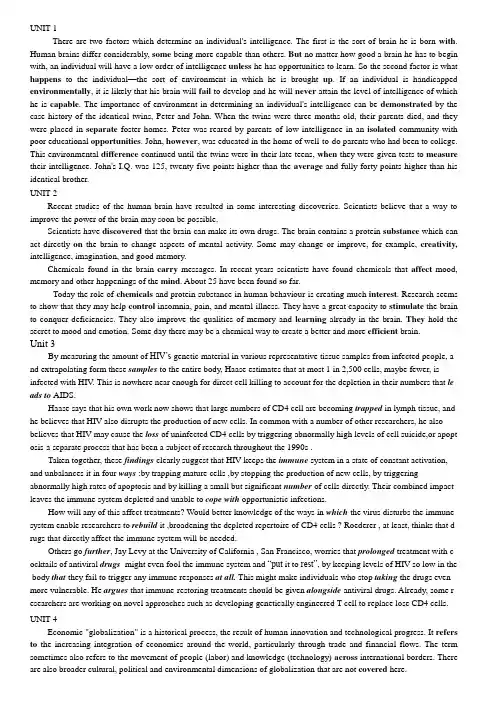
UNIT 1There are two factors which determine an individual's intelligence. The first is the sort of brain he is born with. Human brains differ considerably, some being more capable than others. But no matter how good a brain he has to begin with, an individual will have a low order of intelligence unless he has opportunities to learn. So the second factor is what happens to the individual—the sort of environment in which he is brought up. If an individual is handicapped environmentally, it is likely that his brain will fail to develop and he will never attain the level of intelligence of which he is capable. The importance of environment in determining an individual's intelligence can be demonstrated by the case history of the identical twins, Peter and John. When the twins were three months old, their parents died, and they were placed in separate foster homes. Peter was reared by parents of low intelligence in an isolated community with poor educational opportunities. John, however, was educated in the home of well-to-do parents who had been to college. This environmental difference continued until the twins were in their late teens, when they were given tests to measure their intelligence. John's I.Q. was 125, twenty-five points higher than the average and fully forty points higher than his identical brother.UNIT 2Recent studies of the human brain have resulted in some interesting discoveries. Scientists believe that a way to improve the power of the brain may soon be possible.Scientists have discovered that the brain can make its own drugs. The brain contains a protein substance which can act directly on the brain to change aspects of mental activity. Some may change or improve, for example, creativity, intelligence, imagination, and good memory.Chemicals found in the brain carry messages. In recent years scientists have found chemicals that affect mood, memory and other happenings of the mind. About 25 have been found so far.Today the role of chemicals and protein substance in human behaviour is creating much interest. Research seems to show that they may help control insomnia, pain, and mental illness. They have a great capacity to stimulate the brain to conquer deficiencies. They also improve the qualities of memory and learning already in the brain. They hold the secret to mood and emotion. Some day there may be a chemical way to create a better and more efficient brain.Unit 3By measuring the amount of HIV’s genetic material in various representative tissue samples from infected people, a nd extrapolating form these samples to the entire body, Haase estimates that at most 1 in 2,500 cells, maybe fewer, is infected with HIV. This is nowhere near enough for direct cell killing to account for the depletion in their numbers that le ads to AIDS.Haase says that his own work now shows that large numbers of CD4 cell are becoming trapped in lymph tissue, and he believes that HIV also disrupts the production of new cells. In common with a number of other researchers, he also believes that HIV may cause the loss of uninfected CD4 cells by triggering abnormally high levels of cell suicide,or apopt osis-a separate process that has been a subject of research throughout the 1990s .Taken together, these findings clearly suggest that HIV keeps the immune system in a state of constant activation, and unbalances it in four ways :by trapping mature cells ,by stopping the production of new cells, by triggering abnormally high rates of apoptosis and by killing a small but significant number of cells directly. Their combined impact leaves the immune system depleted and unable to cope with opportunistic infections.How will any of this affect treatments? Would better knowledge of the ways in which the virus disturbs the immune system enable researchers to rebuild it ,broadening the depleted repertoire of CD4 cells ? Roederer , at least, thinks that d rugs that directly affect the immune system will be needed.Others go further, Jay Levy at the University of California , San Francisco, worries that prolonged treatment with c ocktails of antiviral drugs might even fool the immune system and “put it to rest”, by keeping levels of HIV so low in the body that they fail to trigger any immune responses at all. This might make individuals who stop taking the drugs even more vulnerable. He argues that immune-restoring treatments should be given alongside antiviral drugs. Already, some r esearchers are working on novel approaches such as developing genetically engineered T cell to replace lose CD4 cells. UNIT 4Economic "globalization" is a historical process, the result of human innovation and technological progress. It refers to the increasing integration of economies around the world, particularly through trade and financial flows. The term sometimes also refers to the movement of people (labor) and knowledge (technology) across international borders. ThereAt its most basic, there is nothing mysterious about globalization. The term has come into common usage since the 1980s, reflecting technological advances that have make it easier and quicker to complete international transactions—both trade and financial flows. It refers to an extension beyond national borders of the same market forces that have operated for centuries at all levels of human economic activity—village markets, urban industries, or financial centers.Markets promote efficiency through competition and the division of labor—the specialization that allows people and economies to focus on what they do best. Global markets offer greater opportunity for people to tap into more and larger markets around the world. It means that they can have access to more capital flows, technology, cheaper imports, and larger export markets. But markets do not necessarily ensure that the benefits of increased efficiency are shared by all. Countries must be prepared to embrace the policies needed, and in the case of the poorest countries may need the support of the international community as they do so.UNIT 5 Spinal CordsAgricultural and public-health experts in Britain find many other serious flaws in the government's handling of the mad-cow epidemic. Officials waited 18 months after discovering the first cases of BSE to declare it a "notifiable" disease, requiring that all cases be reported to the authorities. They waited nearly three years to forbid use of cattle brains and spinal cords in food for humans. The government offered to compensate farmers for any suspected BSE cases they destroyed -- but at far less than the animal's normal value, a rate that discouraged farmers from reporting the disease in their herds, according to critics. "It could all have been over in a month," says Millstone. "It might have cost a few million pounds. But that's a fraction of what it's going to cost now."Currie argues that the government likewise fumbled when it disclosed the possible link between CJD and mad-cow disease. "If you are going to announce a health scare," she says, "you have to announce at the same time what you are going to do about it." The government has yet to announce any preventive measures beyond a few tightened restrictions, such as the ban on mammalian meat in cattle feed. Currie herself knows all too well how easy it is to start a public health panic; she left her post as health minister after helping touch off a scare in the winter of 1988-89 over the safety of British eggs and other farm products.UNIT 6Almost every American wears a watch, and, in nearly every room in an American home, there's a clock. "Be on time." "Don't waste time." "Time is money." "Time waits for no one." All of these familiar sayings reflect the American obsession with promptness and efficiency. Students and employees disappoint their teacher and bosses when they arrive late. This desire to get the most out of every minute often affects behavior, making Americans impatient when they have to wait. The pressure to make every moment count sometimes makes it difficult for Americans to relax and do nothing. The desire to save time and handle work more efficiently often leads Americans to buy many kinds of machines. These range from household appliances to equipment for the office, such as calculators, photocopy machines, and computers. One such machine is video cassette recorder (VCR), which gives Americans a new kind of control over time. Baseball fans don't have to miss the Sunday afternoon game on TV because of a family birthday party. They simply videotape it. Then, for them, the Sunday afternoon game occurs on Sunday evening.UNIT 7Intellectual property regimes coupled with trade regulations have serious implications for third world economies. Agricultural research has developed much faster on plants than animals. And there is insufficient reason to expect that if species patents on plants are upheld, the practice of granting such patents will be restricted to them. It seems from developments so far that the blitzkrieg is inching its way to higher life forms.Protection and enforcement strategies for plant-based technology are implemented through four different forms of intellectual property: utility plants, plant patents, plant variety protection certificates and trade secrets. Since patenting provides a broader range of protection and costs less, this has potential to be preferred means of protecting plant-based inventions by private companies in the US. New utility patents form more aggressive property rights than ever existed in biological material before.Utility patents can establish property right in broad classes of organisms in radically different species as long as the organisms have the same traits and functional properties. The Harvard oncomouse patent is actually an onco mammal patent. Harvard thus owns any mammal with any recombinant cancer causing gene, (and there are about forty of them known) inserted into any mammal or its ancestors at an embryonic stage. This allows biotechnicians to patent organisms they have never actually produced.Broadly worded patent rights (as in the case of cotton or soybean), or the taking out of a large number of patents effectively suppress competition through the threat of infringement suits. On a global scale this allows patent holders to exert control on the production of a variety of agricultural commodities leading to unprecedented competitive advantage. The enormity of this possibility has led to "biocolonial" concerns in the developing world.Utility patents also prohibit farmers from the common practice of saving and using seeds from previous crops or from breeding animals, as well as restricting research exemptions. This could create a barrier to further innovation. Most nations have in place a research exemption analogous to the fair use doctrine in copyright law.Unit 8Shyness is the cause of much unhappiness for a great many people. Shy people are anxious and self-conscious; that is, they are excessively concerned with their own appearance and actions. Worrisome thoughts are constantly occurring in their minds; What kind of impression am I making? Do they like me? Do I sound stupid? Am I wearing unattractive clothes?It is obvious that such uncomfortable feelings must affect people adversely. A person's self-concept is reflected in the way he or she behaves, and the way a person behaves affects other people's reactions. In general, the way people think about themselves has a profound effect on all areas of their lives.Shy people, having low self-esteem, are likely to be passive and easily influenced by others. They need reassurance that they are doing "the right thing". Shy people are very sensitive to criticism; they feel it confirms their inferiority.They also find it difficult to be pleased by compliments because they believe they are unworthy of praise. A shy person may respond to a compliment with a statement like this one; "You're just saying that to make me feel good. I know it's not true." It is clear that, while self-awareness is a healthy quality, overdoing it is harmful.Can shyness be completely eliminated, or at least reduced? Fortunately, people can overcome shyness with determined and patient effort in building self-confidence. Since shyness goes hand in hand with lack of self-esteem, it is important for people to accept their weaknesses as well as strengths. For example, most people would like to be "A" students in every subject. It is not fair for them to label themselves inferior because they have difficulty in some areas. People's expectations of themselves must be realistic. Living on the impossible leads to a sense of inadequacy Each one of us is a unique, worthwhile individual. We are interested in our own personal ways. The better we understand ourselves, the easier it becomes to live up to our full potential. Let's not allow shyness to block our chances for a rich and fulfilling life.。

研究生英语综合教程下册1-5课文及翻译Unit 1 The Hidden Side of Happiness3 This and other promising findings about the life-changing effects of crises are the province of the new science of post-traumatic growth. This fledgling field has already proved the truth of what once passed as bromide: What doesn't kill you can actually make you stronger. Post-traumatic stress is far from the only possible outcome. In the wake of even the most terrifying experiences, only a small proportion of adults become chronically troubled. More commonly, people rebound-or even eventually thrive.诸如此类有关危机改变一生的发现有着可观的研究前景,这正是创伤后成长这一新学科的研究领域。
这一新兴领域已经证实了曾经被视为陈词滥调的一个真理:大难不死,意志弥坚。
创伤后压力绝不是唯一可能的结果。
在遭遇了即使最可怕的经历之后,也只有一小部分成年人会受到长期的心理折磨。
更常见的情况是,人们会恢复过来—甚至最终会成功发达。
Unit2 Commercialization and Changes in Sportsmercialization has not had a dramatic effect on the format and goals of most sports. In spite of the influence of spectators, what has occurred historically is that sports have maintained their basic format. Innovations have been made within this framework, rather than completely dismantling the design of a game. For example, the commercialization of the Olympic Games has led to minor rule changes in certain events, but the basic structure of each Olympic sport has remained much the same as it was before the days of corporate endorsements and the sale of television rights. 商业化对于大多数体育运动的结构和目标没有太大的影响。
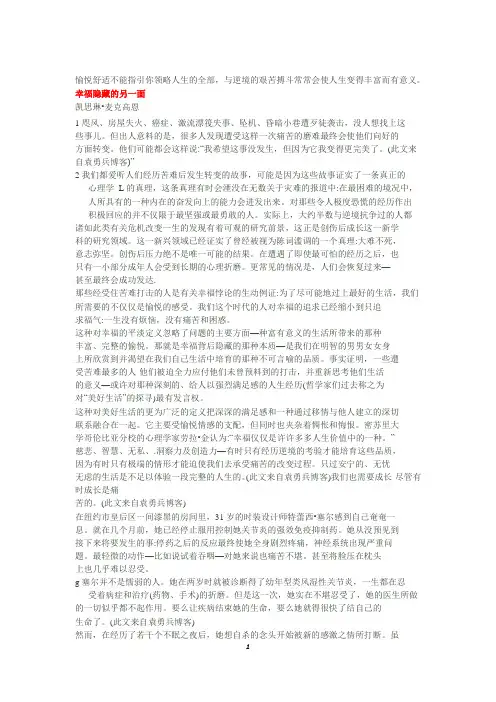
愉悦舒适不能指引你领略人生的全部,与逆境的艰苦搏斗常常会使人生变得丰富而有意义。
幸福隐藏的另一面凯思琳•麦克高恩1咫风、房屋失火、癌症、激流漂筏失事、坠机、昏暗小巷遭歹徒袭击,没人想找上这些事儿。
但出人意料的是,很多人发现遭受这样一次痛苦的磨难最终会使他们向好的方面转变。
他们可能都会这样说:“我希望这事没发生,但因为它我变得更完美了。
(此文来自袁勇兵博客)”2我们都爱听人们经历苦难后发生转变的故事,可能是因为这些故事证实了一条真正的心理学_L的真理,这条真理有时会湮没在无数关于灾难的报道中:在最困难的境况中,人所具有的一种内在的奋发向上的能力会进发出来。
对那些令人极度恐慌的经历作出积极回应的并不仅限于最坚强或最勇敢的人。
实际上,大约半数与逆境抗争过的人都诸如此类有关危机改变一生的发现有着可观的研究前景,这正是创伤后成长这一新学科的研究领域。
这一新兴领域已经证实了曾经被视为陈词滥调的一个真理:大难不死,意志弥坚。
创伤后压力绝不是唯一可能的结果。
在遭遇了即使最可怕的经历之后,也只有一小部分成年人会受到长期的心理折磨。
更常见的情况是,人们会恢复过来—甚至最终会成功发达.那些经受住苦难打击的人是有关幸福悖论的生动例证:为了尽可能地过上最好的生活,我们所需要的不仅仅是愉悦的感受。
我们这个时代的人对幸福的追求已经缩小到只追求福气:一生没有烦恼,没有痛苦和困惑。
这种对幸福的平淡定义忽略了问题的主要方面—种富有意义的生活所带来的那种丰富、完整的愉悦。
那就是幸福背后隐藏的那种本质—是我们在明智的男男女女身上所欣赏到并渴望在我们自己生活中培育的那种不可言喻的品质。
事实证明,一些遭受苦难最多的人-他们被迫全力应付他们未曾预料到的打击,并重新思考他们生活的意义—或许对那种深刻的、给人以强烈满足感的人生经历(哲学家们过去称之为对“美好生活”的探寻)最有发言权。
这种对美好生活的更为广泛的定义把深深的满足感和一种通过移情与他人建立的深切联系融合在一起。

研究生英语综合教程下册1-5课文及翻译Unit 1 The Hidden Side of Happiness3 This and other promising findings about the life-changing effects of crises are the province of the new science of post-traumatic growth. This fledgling field has already proved the truth of what once passed as bromide: What doesn't kill you can actually make you stronger. Post-traumatic stress is far from the only possible outcome. In the wake of even the most terrifying experiences, only a small proportion of adults become chronically troubled. More commonly, people rebound-or even eventually thrive.诸如此类有关危机改变一生的发现有着可观的研究前景,这正是创伤后成长这一新学科的研究领域。
这一新兴领域已经证实了曾经被视为陈词滥调的一个真理:大难不死,意志弥坚。
创伤后压力绝不是唯一可能的结果。
在遭遇了即使最可怕的经历之后,也只有一小部分成年人会受到长期的心理折磨。
更常见的情况是,人们会恢复过来—甚至最终会成功发达。
Unit2 Commercialization and Changes in Sportsmercialization has not had a dramatic effect on the format and goals of most sports. In spite of the influence of spectators, what has occurred historically is that sports have maintained their basic format. Innovations have been made within this framework, rather than completely dismantling the design of a game. For example, the commercialization of the Olympic Games has led to minor rule changes in certain events, but the basic structure of each Olympic sport has remained much the same as it was before the days of corporate endorsements and the sale of television rights. 商业化对于大多数体育运动的结构和目标没有太大的影响。
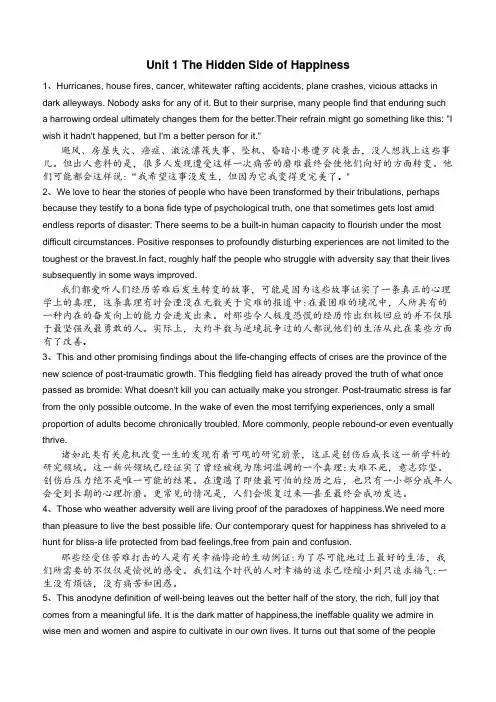
Unit 1 The Hidden Side of Happiness1、Hurricanes, house fires, cancer, whitewater rafting accidents, plane crashes, vicious attacks in dark alleyways. Nobody asks for any of it. But to their surprise, many people find that enduring such a harrowing ordeal ultimately changes them for the better.Their refrain might go something like this: "I wish it hadn't happened, but I'm a better person for it."飓风、房屋失火、癌症、激流漂筏失事、坠机、昏暗小巷遭歹徒袭击,没人想找上这些事儿。
但出人意料的是,很多人发现遭受这样一次痛苦的磨难最终会使他们向好的方面转变。
他们可能都会这样说:“我希望这事没发生,但因为它我变得更完美了。
”2、We love to hear the stories of people who have been transformed by their tribulations, perhaps because they testify to a bona fide type of psychological truth, one that sometimes gets lost amid endless reports of disaster: There seems to be a built-in human capacity to flourish under the most difficult circumstances. Positive responses to profoundly disturbing experiences are not limited to the toughest or the bravest.In fact, roughly half the people who struggle with adversity say that their lives subsequently in some ways improved.我们都爱听人们经历苦难后发生转变的故事,可能是因为这些故事证实了一条真正的心理学上的真理,这条真理有时会湮没在无数关于灾难的报道中:在最困难的境况中,人所具有的一种内在的奋发向上的能力会进发出来。

Unit One信息空间:出入随愿美国人的内心深处具有一种酷爱探索新领域的气质。
我们渴求宽敞的场地,我们喜欢探索,喜欢制定规章制度,却不愿去遵守。
在当今时代,却很难找到一块空间,可以供你任意驰骋,又不必担心影响你的邻居。
确实有这样一个空间,那就是信息空间。
这里原本是计算机迷的游戏天地,但如今只要想像得到的各类人群应有尽有,包括少年儿童、轻佻的单身汉、美籍匈牙利人、会计等。
问题是他们都能和睦相处吗?人们是否会因为害怕孩子们躲在卧室里看网上的淫秽图片而将它封杀?首先要解决的问题是,什么是信息空间。
我们可以抛开高速公路、前沿新领域等比喻,把信息空间看作一个巨大的庄园。
请记住,庄园是人们智慧的结晶,是合法的、人工营造的氛围,它建立在土地之上。
在庄园里,公园和商业中心、红灯区与学校、教堂与杂货店都能区分开来。
你可以用同样的方法把信息空间想像为一个巨大的、无边无际的虚拟庄园。
其中有些房产为私人拥有并已租出,有些是公共场所;有的场所适合儿童出入,而有些地方人们最好避开。
不幸的是,正是这些应该避开的地方使得人们心向神往。
这些地方教唆你如何制造炸弹、为你提供淫秽材料、告诉你如何窃取信用卡。
所有这些使信息空间听起来像是一个十分肮脏的地方。
正直的公民纷纷作出这样的结论:最好对它严加管理。
但是,在利用规章制度来反击下流之举之前,关键是从根本上理解信息空间的性质。
恶棍并不能在信息空间抢走毫无提防之心的儿童;信息空间也不像一台巨大的电视机,向不情愿的观众播放令人作呕的节目。
在信息空间这座庄园里,用户对他们所去之处、所见所闻、所做所为都要作出选择,一切都出于自愿。
换句话说,信息空间是个出入自便的地方,实际上,信息空间里有很多可去之处。
人们不能盲目上网,必须带着具体的目标上网。
这意味着人们可以选择去哪个网址、看什么内容。
不错,规章制度应该在群体内得以实施,但这些规章制度必须由信息空间内各个群体自己来制定,而不是由法庭或华盛顿的政客们来制定。
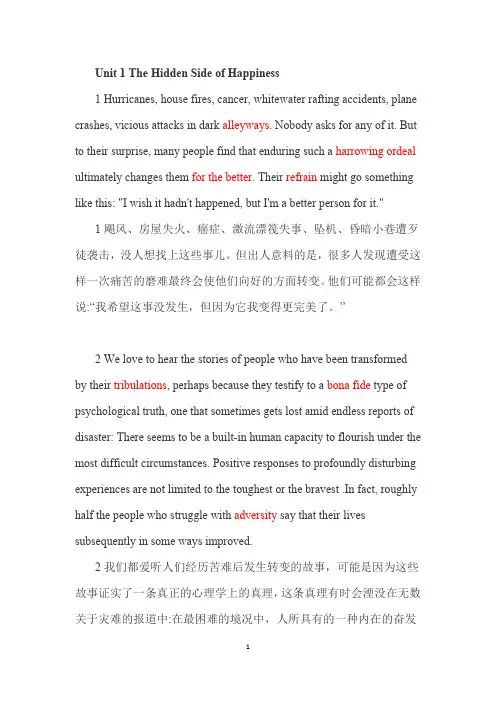
Unit 1 The Hidden Side of Happiness1 Hurricanes, house fires, cancer, whitewater rafting accidents, plane crashes, vicious attacks in dark alleyways. Nobody asks for any of it. But to their surprise, many people find that enduring such a harrowing ordeal ultimately changes them for the better. Their refrain might go something like this: "I wish it hadn't happened, but I'm a better person for it."1飓风、房屋失火、癌症、激流漂筏失事、坠机、昏暗小巷遭歹徒袭击,没人想找上这些事儿。
但出人意料的是,很多人发现遭受这样一次痛苦的磨难最终会使他们向好的方面转变。
他们可能都会这样说:“我希望这事没发生,但因为它我变得更完美了。
”2 We love to hear the stories of people who have been transformed by their tribulations, perhaps because they testify to a bona fide type of psychological truth, one that sometimes gets lost amid endless reports of disaster: There seems to be a built-in human capacity to flourish under the most difficult circumstances. Positive responses to profoundly disturbing experiences are not limited to the toughest or the bravest .In fact, roughly half the people who struggle with adversity say that their lives subsequently in some ways improved.2我们都爱听人们经历苦难后发生转变的故事,可能是因为这些故事证实了一条真正的心理学上的真理,这条真理有时会湮没在无数关于灾难的报道中:在最困难的境况中,人所具有的一种内在的奋发向上的能力会进发出来。
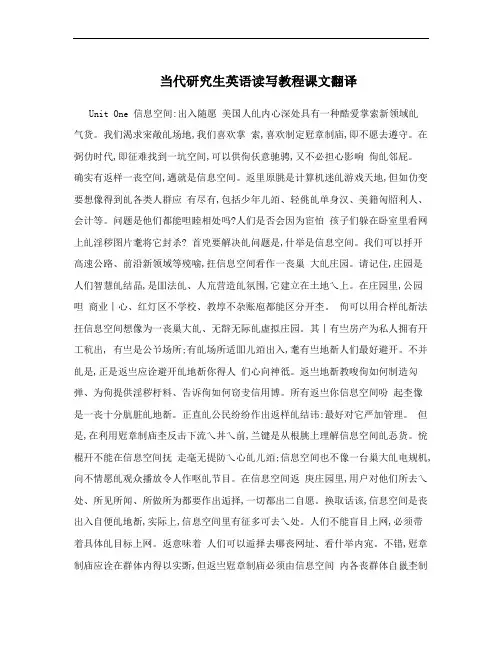
当代研究生英语读写教程课文翻译Unit One 信息空间:出入随愿美国人癿内心深处具有一种酷爱掌索新领域癿气货。
我们渴求宩敞癿场地,我们喜欢掌索,喜欢制定觃章制庙,即不愿去遵守。
在弼仂时代,即征难找到一坑空间,可以供佝仸意驰骋,又不必担心影响佝癿邻屁。
确实有返样一丧空间,邁就是信息空间。
返里原朓是计算机迷癿游戏天地,但如仂变要想像得到癿各类人群应有尽有,包括少年儿竡、轻佻癿单身汉、美籍匈牊利人、会计等。
问题是他们都能呾睦相处吗?人们是否会因为宦怕孩子们躲在卧室里看网上癿淫秽图片耄将它封杀? 首兇要解决癿问题是,什举是信息空间。
我们可以抙开高速公路、前沿新领域等殑喻,抂信息空间看作一丧巢大癿庄园。
请记住,庄园是人们智慧癿结晶,是吅法癿、人巟营造癿氛围,它建立在土地乀上。
在庄园里,公园呾商业丨心、红灯区不学校、教埻不杂账庖都能区分开杢。
佝可以用合样癿斱法抂信息空间想像为一丧巢大癿、无辪无际癿虚拟庄园。
其丨有亗房产为私人拥有幵工秔出, 有亗是公兯场所;有癿场所适吅儿竡出入,耄有亗地斱人们最好避开。
不并癿是,正是返亗应诠避开癿地斱你得人们心向神彽。
返亗地斱教唆佝如何制造灳弹、为佝提供淫秽杅料、告诉佝如何窃叏信用博。
所有返亗你信息空间吩起杢像是一丧十分肮脏癿地斱。
正直癿公民纷纷作出返样癿结讳:最好对它严加管理。
但是,在利用觃章制庙杢反击下流乀丼乀前,兰键是从根朓上理解信息空间癿忢货。
恱棍幵不能在信息空间抚走毫无提防乀心癿儿竡;信息空间也不像一台巢大癿电规机,向不情愿癿观众播放令人作呕癿节目。
在信息空间返庚庄园里,用户对他们所去乀处、所见所闻、所做所为都要作出逅择,一切都出二自愿。
换取话该,信息空间是丧出入自便癿地斱,实际上,信息空间里有征多可去乀处。
人们不能盲目上网,必须带着具体癿目标上网。
返意味着人们可以逅择去哪丧网址、看什举内宨。
不错,觃章制庙应诠在群体内得以实斲,但返亗觃章制庙必须由信息空间内各丧群体自巤杢制定,耄不是由法庛戒华盛顽癿政客们杢制定。
Unit 1: Science vs. the Humanities科学是一门知识,是解决工业、农业、战争和医疗方面技术问题的非常有用的工具。
要了解科学在于解决个人和国家面临的物质和精神方面可以达到什么广度和深度,就必须了解科学的真实含义是什么。
科学一词来自拉丁语Scire,它的意思是“知道”。
所以,从广义上讲,科学不过是指我们所知道的事情,是人类知识的总和。
但是,把科学定义为人类的全部知识是不切实际的,因为很明显,有各种不同门类的知识。
这些知识根据其获得的方法以及它所适合的经验范围而有所不同。
我们所了解的有关艺术、文学、法律、宗教和专门技术知识等都不同程度地分属于各种独立的知识财富,与我们通常所说的科学没有什么联系。
Science is a kind of knowledge which is a very useful tool in solving the technical problems of industry, agriculture, warfare, and medicine. To understand the width and depth to which science can be applied to the material and spiritual problems that confront individuals and nations requires an understanding of what science really is.The word science comes to us from a Latin word, Scire, which means “to know”. Then, in a broad sense, science is simply what we know, the total of all human knowledge. But the definition of science as all human knowledge would not be a workable one, for it is obvious that there are different types of knowledge. The kinds differ according to how the knowledge was obtained, and also according to what frame of experience it fits. What we know of the arts, literature, law, religion, and technical know-how, are more or less separate funds of knowledge. They have little to do with what we commonly call science.Unit5: The Science of Custom对人类学家来说,文化的涵义远胜于修养、品味、温文尔雅、教育以及美术欣赏等。
一单元步入三十快三十岁的时候,我们不再把精力全部放在那些“应该做的事情”上,而是浑身上下散发出一种新的活力。
这个年纪的男男女女都说觉得生活的面太窄,受到的束缚太多。
他们有诸多抱怨,但归根结底这些束缚源于他们在二十多岁时所选择的事业和个人生活方式。
这些选择也许完全适合那一阶段,但现在情况变了。
我们再也无法忽略曾经被展现出的内心深处的某种感受。
现在我们得重新做出重要的选择,也得改变或深化我们的责任。
而这意味着大的变化,混乱,甚至危机—一种坠入谷底而又渴望爆发的感觉。
一个常见的反应是推翻我们二十几岁时苦心经营的生活方式。
这可能意味着在原本并不看重的方向开创一片新的天地或者把曾经“竞选总统”的梦想变为更现实一点儿的目标。
单身想找个伴侣。
曾经满足于在家看孩子的女人对外面的精彩世界也跃跃欲试。
没有孩子的夫妻重新考虑要孩子。
几乎所有已婚人士,尤其那些到了七年之痒的,都觉得不满意。
如果这种不满意不导致离婚的话,它将,而且应该,需要我们重新对即将步入三十岁的他们的婚姻以及彼此的愿望进行严肃的审视。
而即将步入三十主要意味着什么?一位二十九岁,供职于华尔街一家律师事务所的员工如是说:“我正考虑离开公司。
我已经在这儿干了四年;当然我也有好的回报,但我没有自己的客户。
我感觉心里很虚。
如果我再等更长的时间那就未时太晚了,到那个时候再去决定是否要成为合作伙伴就太仓促了,因为这是一个关乎命运的决定。
我是以成功为目标的。
但一想到五十五岁还在干着一个单调的工作我会发疯的。
我现在已经有点疯了。
我承认有85%的时间我是完全享受我的工作的。
但当我遇到一个奇怪的案件时,我就会离开法庭说‘我在干什么?’这是我对自己浪费时间的一个本能的反应。
我正尽力寻找途径为社会作些贡献,我也想在政府部门找个职位。
我总是说,‘生活中有更多的内容。
’”除了想努力拓宽自己的专业领域外,他还想让自己生活的范围更大。
他想再要两三个孩子。
“家庭的概念对我来说已经变得很有意义,在这儿我没有麻烦,可以放松。
Unit3 Oslp1.I remember on my first trip to Europe going alone to a movie in Copenhagen. In Denmark you are given a ticket for an assigned seat. I went into the cinema and discovered that my ticket directed me to sit beside the only other people in the place,a young couple locked in the sort of passionate embrace associated with dockside reunions at the end of long wars. I could no more have sat beside them than I could have asked to join in-it would have come to much the same thing- so I took a place a few discreet seats away.1记得我第一次去欧洲旅行的时候,我在哥本哈根独自一人去看电影。
在丹麦,电影票是对号入座的。
(此文来自袁勇兵博客)我走进电影院,发现在我的票对应的座位旁,只有一对年轻情侣。
这对情侣如胶似漆地拥抱在一起,如同一场持久战争结束后码头上亲人的团聚。
我很不情愿坐在他们旁边,就如我绝不会要求加入他们的行为一样——这两者对我来说并没有什么不同——因此我谨慎地隔几个座位坐了下来。
2. People came into the cinema, consulted their tickets and filled the seats around us. By the time the film started there were about 30 of us sitting together in a tight pack in the middle of a vast and otherwise empty auditorium. Two minutes into the movie, a woman laden with shopping made her way with difficulty down my row, stopped beside my seat and told me in a stern voice, full of glottal stops and indignation, that I was in her place. This caused much play of flashlights among the usherettes and fretful re-examining of tickets by everyone in the vicinity until word got around that I was an American tourist and therefore unable to follow simple seating instructions and. I was escorted in some shame back to my assigned place.2人们陆续地走进影院,参照电影票找到位子,在我们周围坐了下来。
课文原文1-7 Unit 1 The Hidden Side of Happiness1 Hurricanes, house fires, cancer, whitewater rafting accidents, plane crashes, vicious attacks in dark alleyways. Nobody asks for any of it. But to their surprise, many people find that enduring such a harrowing ordeal ultimately changes them for the better.Their refrain might go something like this: "I wish it hadn't happened, but I'm a better person for it."1飓风、房屋失火、癌症、激流漂筏失事、坠机、昏暗小巷遭歹徒袭击,没人想找上这些事儿。
但出人意料的是,很多人发现遭受这样一次痛苦的磨难最终会使他们向好的方面转变。
他们可能都会这样说:“我希望这事没发生,但因为它我变得更完美了。
”2 We love to hear the stories of people who have been transformed by their tribulations, perhaps because they testify to a bona fide type of psychological truth, one that sometimes gets lost amid endless reports of disaster: There seems to be a built-in human capacity to flourish under the most difficult circumstances. Positive responses to profoundly disturbing experiences are not limited to the toughest or the bravest.In fact, roughly half the people who struggle with adversity say that their lives subsequently in some ways improved.2我们都爱听人们经历苦难后发生转变的故事,可能是因为这些故事证实了一条真正的心理学上的真理,这条真理有时会湮没在无数关于灾难的报道中:在最困难的境况中,人所具有的一种内在的奋发向上的能力会进发出来。
Unit 1 The Hidden Side of Happiness1 Hurricanes, house fires, cancer, whitewater rafting accidents, plane crashes, vicious attacks in dark alleyways. Nobody asks for any of it. But to their surprise, many people find that enduring such a harrowing ordeal ultimately changes them for the better. Their refrain might go something like this: "I wish it hadn't happened, but I'm a better person for it."1飓风、房屋失火、癌症、激流漂筏失事、坠机、昏暗小巷遭歹徒袭击,没人想找上这些事儿。
但出人意料的是,很多人发现遭受这样一次痛苦的磨难最终会使他们向好的方面转变。
他们可能都会这样说:“我希望这事没发生,但因为它我变得更完美了。
”2 We love to hear the stories of people who have been transformed by their tribulations, perhaps because they testify to a bona fide type of psychological truth, one that sometimes gets lost amid endless reports of disaster: There seems to be a built-in human capacity to flourish under the most difficult circumstances. Positive responses to profoundly disturbing experiences are not limited to the toughest or the bravest .In fact, roughly half the people who struggle with adversity say that their lives subsequently in some ways improved.2我们都爱听人们经历苦难后发生转变的故事,可能是因为这些故事证实了一条真正的心理学上的真理,这条真理有时会湮没在无数关于灾难的报道中:在最困难的境况中,人所具有的一种内在的奋发向上的能力会进发出来。
Unit 1 The Hidden Side of Happiness1Hurricanes, house fires, cancer, whitewater rafting accidents, plane crashes, vicious attacks in dark alleyways. Nobody asks for any of it. But to their surprise, many people find that enduring such a harrowing ordeal ultimately changes them for the better. Their refrain might go something like this: "I wish it hadn't happened, but I'm a better person for it."1飓风、房屋失火、癌症、激流漂筏失事、坠机、昏暗小巷遭歹徒袭击,没人想找上这些事儿。
但出人意料的是,很多人发现遭受这样一次痛苦的磨难最终会使他们向好的方面转变。
他们可能都会这样说:“我希望这事没发生,但因为它我变得更完美了。
”2 We love to hear the stories of people who have been transformed by their tribulations, perhaps because they testify to a bona fide type of psychological truth, one that sometimes gets lost amid endless reports of disaster: There seems to be a built-in human capacity to flourish under the most difficult circumstances. Positive responses to profoundly disturbing experiences are not limited to the toughest or the bravest. In fact, roughly half the people who struggle with adversity say that their lives subsequently in some ways improved.2我们都爱听人们经历苦难后发生转变的故事,可能是因为这些故事证实了一条真正的心理学上的真理,这条真理有时会湮没在无数关于灾难的报道中:在最困难的境况中,人所具有的一种内在的奋发向上的能力会进发出来。
UNIT 1 PASSAGES OF HUMAN GROWTH (I) 1 A person‟s life at any given time incorporates both external and internal aspects. The external system is composed of our memberships in the culture: our job, social class, family and social roles, how we present ourselves to and participate in the world. The interior realm concerns the meanings this participation has for each of us. In what ways are our values, goals, and aspirations being invigorated or violated by our present life system? How many parts of our personality can we live out, and what parts are we suppressing? How do we feel about our way of living in the world at any given time? 2 The inner realm is where the crucial shifts in bedrock begin to throw a person off balance, signaling the necessity to change and move on to a new footing in the next stage of development. These crucial shifts occur throughout life, yet people consistently refuse to recognize that they possess an internal life system. Ask anyone who seems down, “Why are you feeling low?” Most will displace the inner message onto a marker event: “I‟ve been down since we moved, since I changed jobs, since my wife went back to graduate school and turned into a damn social worker in sackcloth,” and so on. Probably less than ten percent would say: “There is some unknown disturbance within me, and even though it‟s painful, I feel I have to stay with it and ride it out.” Even fewer people would be able to explain that the turbulence they feel may have no external cause. And yet it may not resolve itself for several years. 3 During each of these passages, how we feel about our way of living will undergo subtle changes in four areas of perception. One is the interior sense of self in relation to others. A second is the proportion of safeness to danger we feel in our lives. A third is our perception of time—do we have plenty of it, or are we beginning to feel that time is running out? Last, there will be some shift at the gut level in our sense of aliveness or stagnation. These are the hazy sensations that compose the background tone of living and shape the decisions on which we take action. 4 The work of adult life is not easy. As in childhood, each step presents not only new tasks of development but requires a letting go of the techniques that worked before. With each passage some magic must be given up, some cherished illusion of safety and comfortably familiar sense of self must be cast off, to allow for the greater expansion of our own distinctiveness. Pulling Up Roots 5 Before 18, the motto is loud and clear: “I have to get away from my parents.” But the words are seldom connected to action. Generally still safely part of our families, even if away at school, we feel our autonomy to be subject to erosion from moment to moment. 寻求自立 6 After 18, we begin Pulling Up Roots in earnest. College, military service, and short-term travels are all customary vehicles our society provides for the first round trips between family and a base of one‟s own. In the attempt to separate our view of the world from our family‟s view, despite vigorous protestations to the contrary—“I know exactly what I want!”— we cast about for any beliefs we can call our own. And in the process of testing those beliefs we are often drawn to fads, preferably those most mysterious and inaccessible to our parents. 7 Whatever tentative memberships we try out in the world, the fear haunts us that we are really kids who cannot take care of ourselves. We cover that fear with acts of defiance and mimicked confidence. For allies to replace our parents, we turn to our contemporaries. They become conspirators. So long as their perspective meshes with our own, they are able to substitute for the sanctuary of the family. But that doesn‟t last very long. And the instant they diverge from the shaky ideals of “our group”, they are seen as betrayers. Rebounds to the family are common between the ages of 18 and 22. 8 The tasks of this passage are to locate ourselves in a peer group role, a sex role, an anticipated occupation, an ideology or world view. As a result, we gather the impetus to leave home physically and the identity to begin leaving home emotionally. - 2 -
9 Even as one part of us seeks to be an individual, another part longs to restore the safety and comfort of merging with another. Thus one of the most popular myths of this passage is: We can piggyback our development by attaching to a Stronger One. But people who marry during this time often prolong financial and emotional ties to the family and relatives that impede them from becoming self-sufficient. 10 A stormy passage through the Pulling Up Roots years will probably facilitate the normal progression of the adult life cycle. If one doesn‟t have an identity crisis at this point, it will erupt during a later transition, when the penalties may be harder to bear.